Business Economics Report: UK Economy and Co-op Food Analysis
VerifiedAdded on 2020/06/04
|13
|3872
|75
Report
AI Summary
This report provides a comprehensive analysis of the business economics of Co-op Food within the context of the UK economy. It begins by explaining the economic problem of scarcity and demand resource allocation, examining how these principles impact both the UK economy and Co-op Food. The report then discusses the roles of demand and supply in the UK economy, including how equilibrium is achieved. It evaluates the significance of different market systems, the role of opportunity cost in Co-op Food's economic decisions, and the importance of elasticity of demand in market interactions. The report further explores the implications of pricing and corporate objectives on Co-op Food's operations, comparing price-setting in various market structures and assessing the influence of UK regulations on Co-op Food's market power. It analyzes the changes in the UK economy in the 21st century and their effects on Co-op Food, evaluating macroeconomic policy tools and the UK's performance in the global market. Finally, the report examines the theory of comparative advantage, the merits and demerits of free trade, the impact of globalization on Co-op Food, and the effects of emerging economies on developed countries, offering a well-rounded view of the economic forces shaping the company and the UK market.
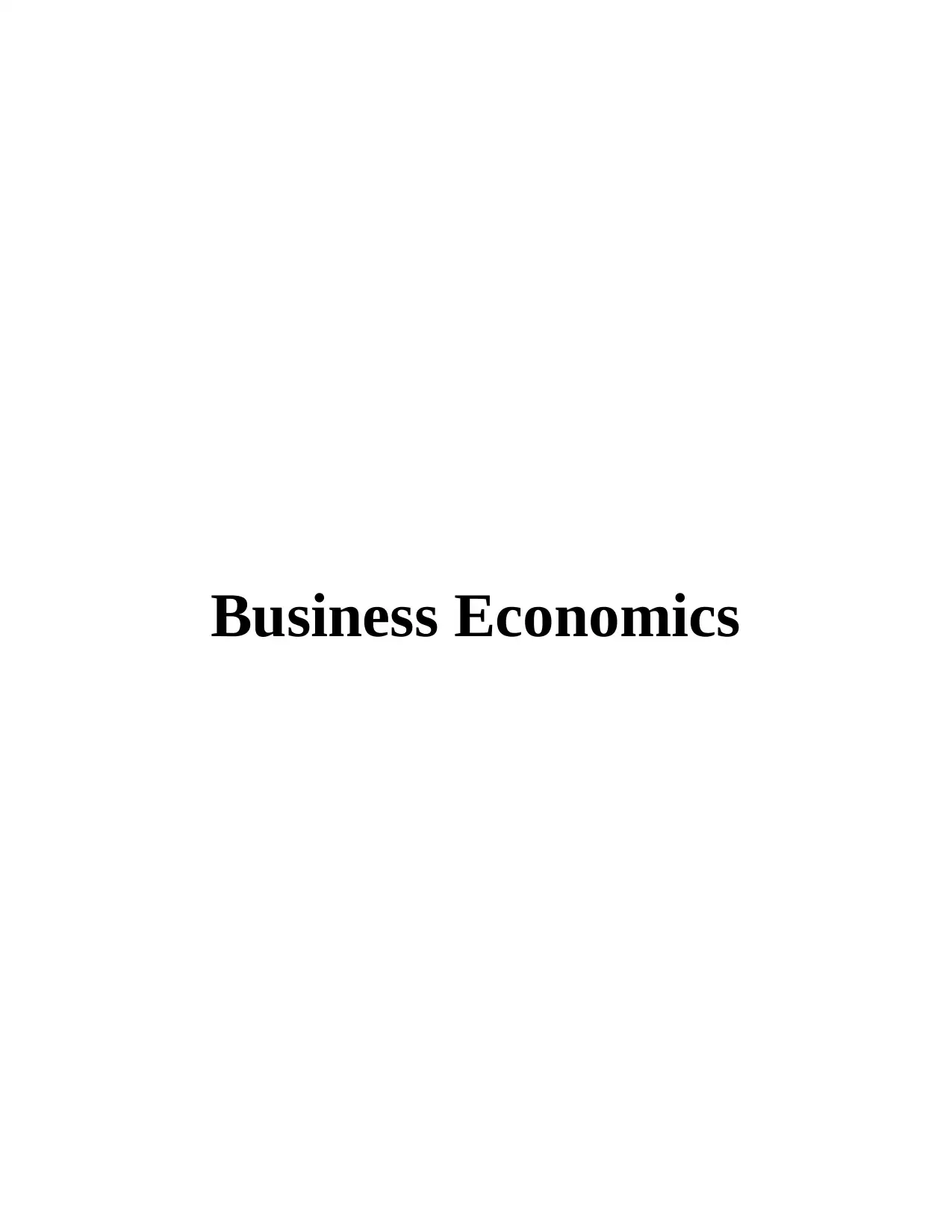
Business Economics
Paraphrase This Document
Need a fresh take? Get an instant paraphrase of this document with our AI Paraphraser
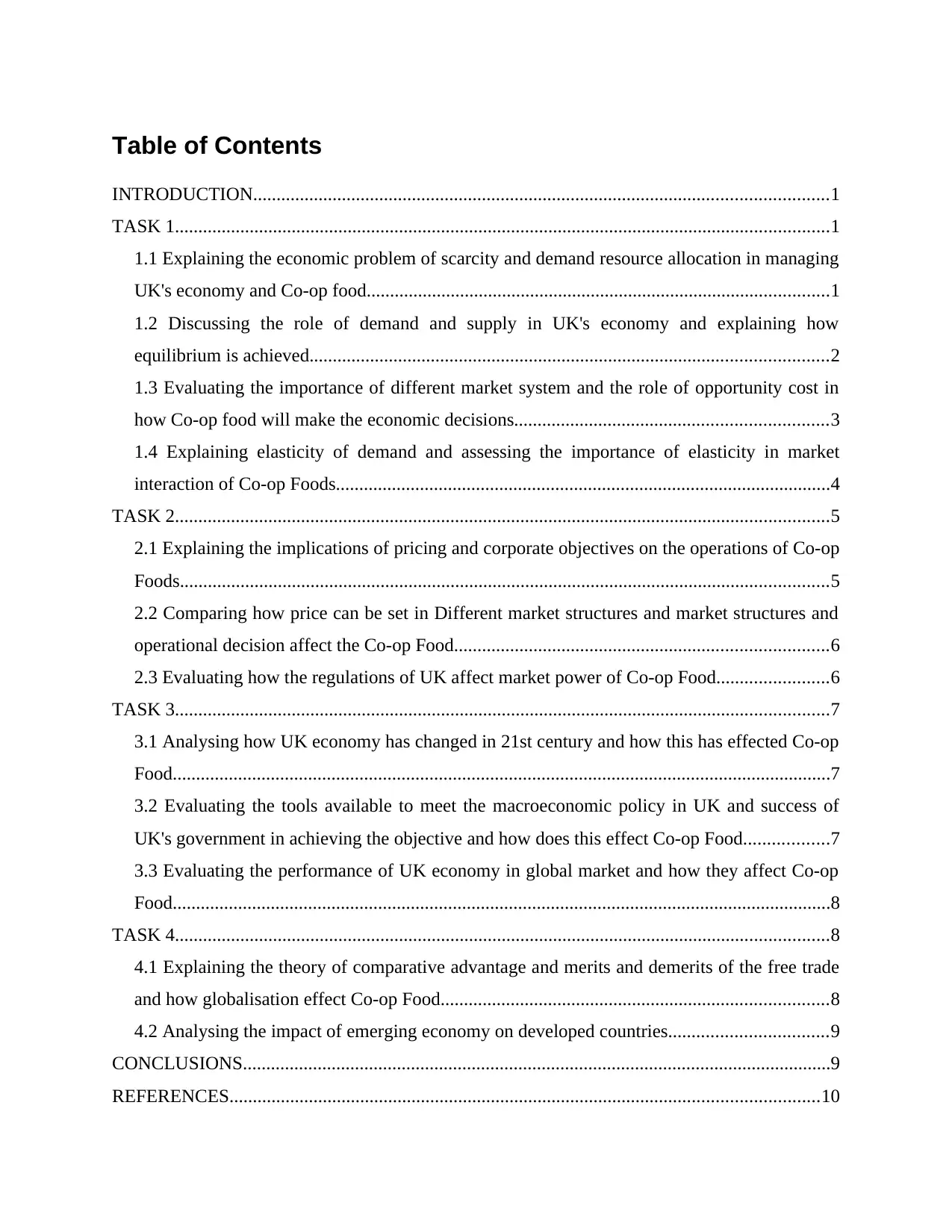
Table of Contents
INTRODUCTION...........................................................................................................................1
TASK 1............................................................................................................................................1
1.1 Explaining the economic problem of scarcity and demand resource allocation in managing
UK's economy and Co-op food...................................................................................................1
1.2 Discussing the role of demand and supply in UK's economy and explaining how
equilibrium is achieved...............................................................................................................2
1.3 Evaluating the importance of different market system and the role of opportunity cost in
how Co-op food will make the economic decisions...................................................................3
1.4 Explaining elasticity of demand and assessing the importance of elasticity in market
interaction of Co-op Foods..........................................................................................................4
TASK 2............................................................................................................................................5
2.1 Explaining the implications of pricing and corporate objectives on the operations of Co-op
Foods...........................................................................................................................................5
2.2 Comparing how price can be set in Different market structures and market structures and
operational decision affect the Co-op Food................................................................................6
2.3 Evaluating how the regulations of UK affect market power of Co-op Food........................6
TASK 3............................................................................................................................................7
3.1 Analysing how UK economy has changed in 21st century and how this has effected Co-op
Food.............................................................................................................................................7
3.2 Evaluating the tools available to meet the macroeconomic policy in UK and success of
UK's government in achieving the objective and how does this effect Co-op Food..................7
3.3 Evaluating the performance of UK economy in global market and how they affect Co-op
Food.............................................................................................................................................8
TASK 4............................................................................................................................................8
4.1 Explaining the theory of comparative advantage and merits and demerits of the free trade
and how globalisation effect Co-op Food...................................................................................8
4.2 Analysing the impact of emerging economy on developed countries..................................9
CONCLUSIONS..............................................................................................................................9
REFERENCES..............................................................................................................................10
INTRODUCTION...........................................................................................................................1
TASK 1............................................................................................................................................1
1.1 Explaining the economic problem of scarcity and demand resource allocation in managing
UK's economy and Co-op food...................................................................................................1
1.2 Discussing the role of demand and supply in UK's economy and explaining how
equilibrium is achieved...............................................................................................................2
1.3 Evaluating the importance of different market system and the role of opportunity cost in
how Co-op food will make the economic decisions...................................................................3
1.4 Explaining elasticity of demand and assessing the importance of elasticity in market
interaction of Co-op Foods..........................................................................................................4
TASK 2............................................................................................................................................5
2.1 Explaining the implications of pricing and corporate objectives on the operations of Co-op
Foods...........................................................................................................................................5
2.2 Comparing how price can be set in Different market structures and market structures and
operational decision affect the Co-op Food................................................................................6
2.3 Evaluating how the regulations of UK affect market power of Co-op Food........................6
TASK 3............................................................................................................................................7
3.1 Analysing how UK economy has changed in 21st century and how this has effected Co-op
Food.............................................................................................................................................7
3.2 Evaluating the tools available to meet the macroeconomic policy in UK and success of
UK's government in achieving the objective and how does this effect Co-op Food..................7
3.3 Evaluating the performance of UK economy in global market and how they affect Co-op
Food.............................................................................................................................................8
TASK 4............................................................................................................................................8
4.1 Explaining the theory of comparative advantage and merits and demerits of the free trade
and how globalisation effect Co-op Food...................................................................................8
4.2 Analysing the impact of emerging economy on developed countries..................................9
CONCLUSIONS..............................................................................................................................9
REFERENCES..............................................................................................................................10
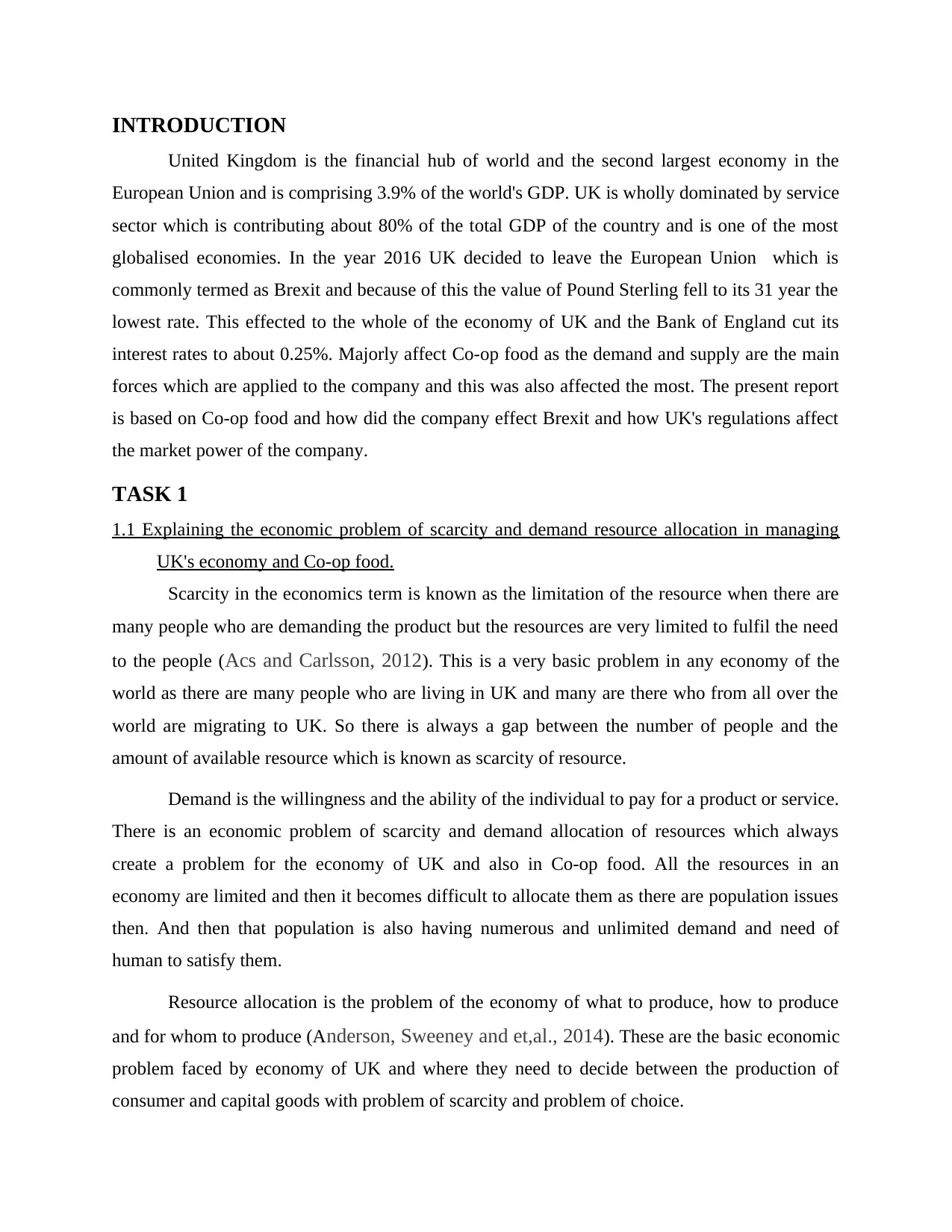
INTRODUCTION
United Kingdom is the financial hub of world and the second largest economy in the
European Union and is comprising 3.9% of the world's GDP. UK is wholly dominated by service
sector which is contributing about 80% of the total GDP of the country and is one of the most
globalised economies. In the year 2016 UK decided to leave the European Union which is
commonly termed as Brexit and because of this the value of Pound Sterling fell to its 31 year the
lowest rate. This effected to the whole of the economy of UK and the Bank of England cut its
interest rates to about 0.25%. Majorly affect Co-op food as the demand and supply are the main
forces which are applied to the company and this was also affected the most. The present report
is based on Co-op food and how did the company effect Brexit and how UK's regulations affect
the market power of the company.
TASK 1
1.1 Explaining the economic problem of scarcity and demand resource allocation in managing
UK's economy and Co-op food.
Scarcity in the economics term is known as the limitation of the resource when there are
many people who are demanding the product but the resources are very limited to fulfil the need
to the people (Acs and Carlsson, 2012). This is a very basic problem in any economy of the
world as there are many people who are living in UK and many are there who from all over the
world are migrating to UK. So there is always a gap between the number of people and the
amount of available resource which is known as scarcity of resource.
Demand is the willingness and the ability of the individual to pay for a product or service.
There is an economic problem of scarcity and demand allocation of resources which always
create a problem for the economy of UK and also in Co-op food. All the resources in an
economy are limited and then it becomes difficult to allocate them as there are population issues
then. And then that population is also having numerous and unlimited demand and need of
human to satisfy them.
Resource allocation is the problem of the economy of what to produce, how to produce
and for whom to produce (Anderson, Sweeney and et,al., 2014). These are the basic economic
problem faced by economy of UK and where they need to decide between the production of
consumer and capital goods with problem of scarcity and problem of choice.
United Kingdom is the financial hub of world and the second largest economy in the
European Union and is comprising 3.9% of the world's GDP. UK is wholly dominated by service
sector which is contributing about 80% of the total GDP of the country and is one of the most
globalised economies. In the year 2016 UK decided to leave the European Union which is
commonly termed as Brexit and because of this the value of Pound Sterling fell to its 31 year the
lowest rate. This effected to the whole of the economy of UK and the Bank of England cut its
interest rates to about 0.25%. Majorly affect Co-op food as the demand and supply are the main
forces which are applied to the company and this was also affected the most. The present report
is based on Co-op food and how did the company effect Brexit and how UK's regulations affect
the market power of the company.
TASK 1
1.1 Explaining the economic problem of scarcity and demand resource allocation in managing
UK's economy and Co-op food.
Scarcity in the economics term is known as the limitation of the resource when there are
many people who are demanding the product but the resources are very limited to fulfil the need
to the people (Acs and Carlsson, 2012). This is a very basic problem in any economy of the
world as there are many people who are living in UK and many are there who from all over the
world are migrating to UK. So there is always a gap between the number of people and the
amount of available resource which is known as scarcity of resource.
Demand is the willingness and the ability of the individual to pay for a product or service.
There is an economic problem of scarcity and demand allocation of resources which always
create a problem for the economy of UK and also in Co-op food. All the resources in an
economy are limited and then it becomes difficult to allocate them as there are population issues
then. And then that population is also having numerous and unlimited demand and need of
human to satisfy them.
Resource allocation is the problem of the economy of what to produce, how to produce
and for whom to produce (Anderson, Sweeney and et,al., 2014). These are the basic economic
problem faced by economy of UK and where they need to decide between the production of
consumer and capital goods with problem of scarcity and problem of choice.
⊘ This is a preview!⊘
Do you want full access?
Subscribe today to unlock all pages.

Trusted by 1+ million students worldwide
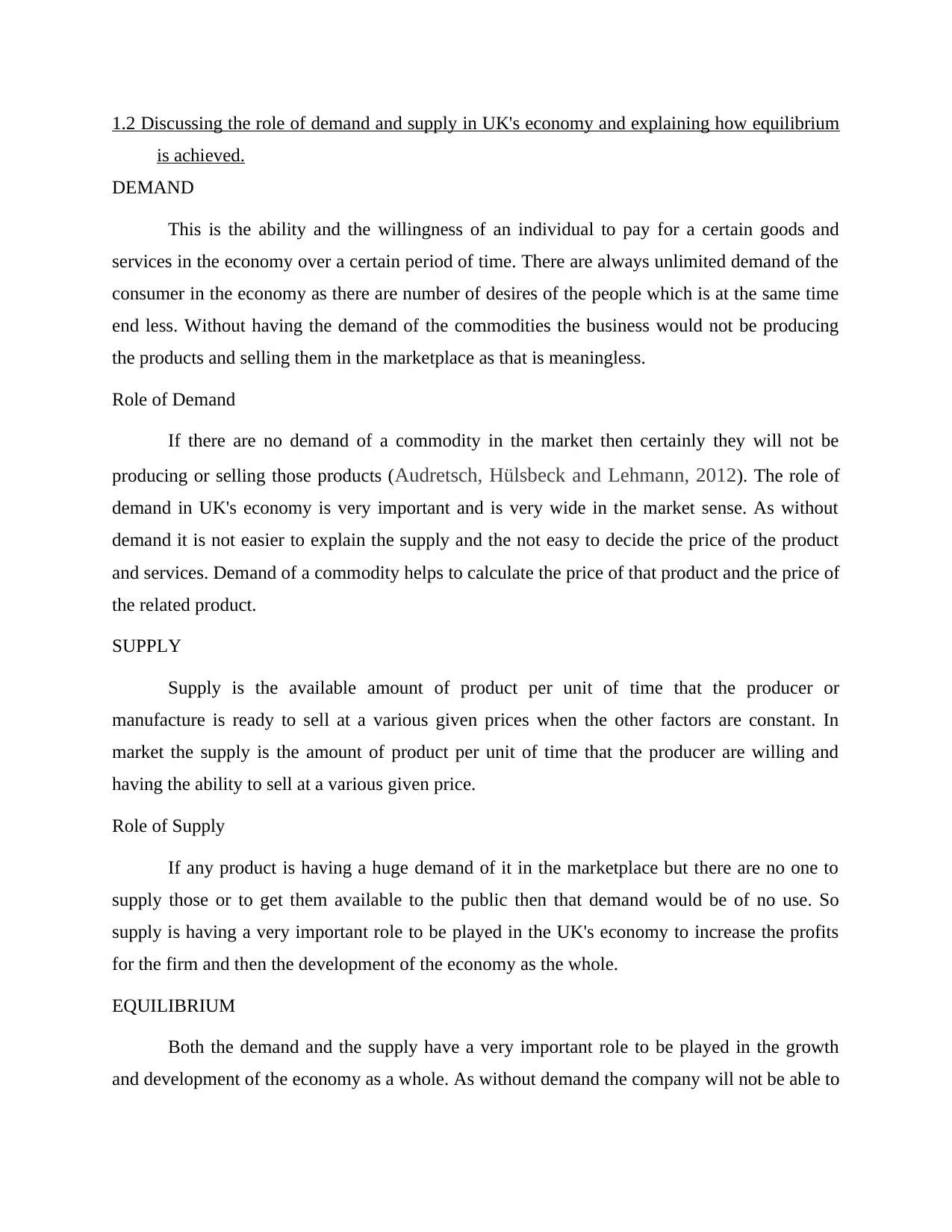
1.2 Discussing the role of demand and supply in UK's economy and explaining how equilibrium
is achieved.
DEMAND
This is the ability and the willingness of an individual to pay for a certain goods and
services in the economy over a certain period of time. There are always unlimited demand of the
consumer in the economy as there are number of desires of the people which is at the same time
end less. Without having the demand of the commodities the business would not be producing
the products and selling them in the marketplace as that is meaningless.
Role of Demand
If there are no demand of a commodity in the market then certainly they will not be
producing or selling those products (Audretsch, Hülsbeck and Lehmann, 2012). The role of
demand in UK's economy is very important and is very wide in the market sense. As without
demand it is not easier to explain the supply and the not easy to decide the price of the product
and services. Demand of a commodity helps to calculate the price of that product and the price of
the related product.
SUPPLY
Supply is the available amount of product per unit of time that the producer or
manufacture is ready to sell at a various given prices when the other factors are constant. In
market the supply is the amount of product per unit of time that the producer are willing and
having the ability to sell at a various given price.
Role of Supply
If any product is having a huge demand of it in the marketplace but there are no one to
supply those or to get them available to the public then that demand would be of no use. So
supply is having a very important role to be played in the UK's economy to increase the profits
for the firm and then the development of the economy as the whole.
EQUILIBRIUM
Both the demand and the supply have a very important role to be played in the growth
and development of the economy as a whole. As without demand the company will not be able to
is achieved.
DEMAND
This is the ability and the willingness of an individual to pay for a certain goods and
services in the economy over a certain period of time. There are always unlimited demand of the
consumer in the economy as there are number of desires of the people which is at the same time
end less. Without having the demand of the commodities the business would not be producing
the products and selling them in the marketplace as that is meaningless.
Role of Demand
If there are no demand of a commodity in the market then certainly they will not be
producing or selling those products (Audretsch, Hülsbeck and Lehmann, 2012). The role of
demand in UK's economy is very important and is very wide in the market sense. As without
demand it is not easier to explain the supply and the not easy to decide the price of the product
and services. Demand of a commodity helps to calculate the price of that product and the price of
the related product.
SUPPLY
Supply is the available amount of product per unit of time that the producer or
manufacture is ready to sell at a various given prices when the other factors are constant. In
market the supply is the amount of product per unit of time that the producer are willing and
having the ability to sell at a various given price.
Role of Supply
If any product is having a huge demand of it in the marketplace but there are no one to
supply those or to get them available to the public then that demand would be of no use. So
supply is having a very important role to be played in the UK's economy to increase the profits
for the firm and then the development of the economy as the whole.
EQUILIBRIUM
Both the demand and the supply have a very important role to be played in the growth
and development of the economy as a whole. As without demand the company will not be able to
Paraphrase This Document
Need a fresh take? Get an instant paraphrase of this document with our AI Paraphraser
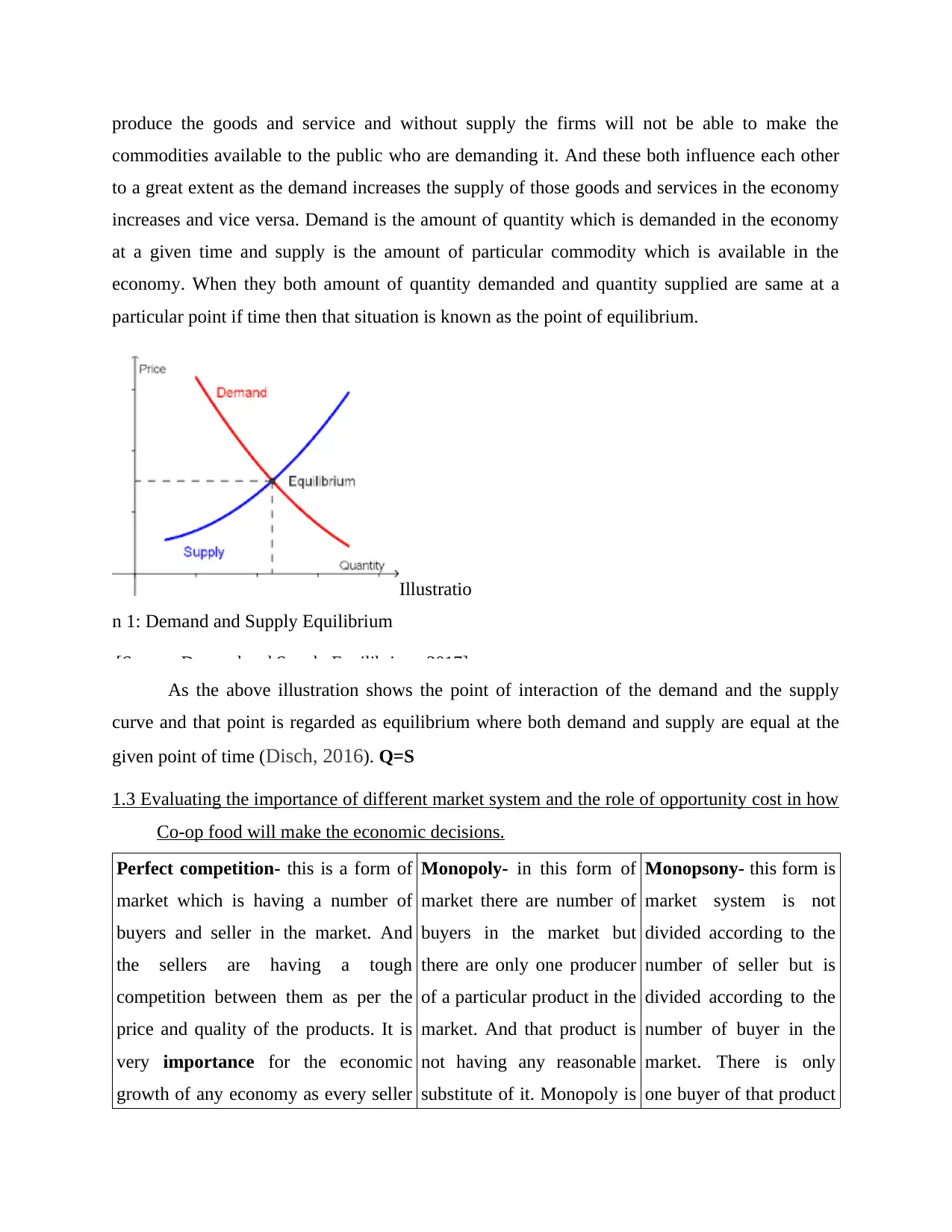
produce the goods and service and without supply the firms will not be able to make the
commodities available to the public who are demanding it. And these both influence each other
to a great extent as the demand increases the supply of those goods and services in the economy
increases and vice versa. Demand is the amount of quantity which is demanded in the economy
at a given time and supply is the amount of particular commodity which is available in the
economy. When they both amount of quantity demanded and quantity supplied are same at a
particular point if time then that situation is known as the point of equilibrium.
Illustratio
n 1: Demand and Supply Equilibrium
[Source: Demand and Supply Equilibrium. 2017]
As the above illustration shows the point of interaction of the demand and the supply
curve and that point is regarded as equilibrium where both demand and supply are equal at the
given point of time (Disch, 2016). Q=S
1.3 Evaluating the importance of different market system and the role of opportunity cost in how
Co-op food will make the economic decisions.
Perfect competition- this is a form of
market which is having a number of
buyers and seller in the market. And
the sellers are having a tough
competition between them as per the
price and quality of the products. It is
very importance for the economic
growth of any economy as every seller
Monopoly- in this form of
market there are number of
buyers in the market but
there are only one producer
of a particular product in the
market. And that product is
not having any reasonable
substitute of it. Monopoly is
Monopsony- this form is
market system is not
divided according to the
number of seller but is
divided according to the
number of buyer in the
market. There is only
one buyer of that product
commodities available to the public who are demanding it. And these both influence each other
to a great extent as the demand increases the supply of those goods and services in the economy
increases and vice versa. Demand is the amount of quantity which is demanded in the economy
at a given time and supply is the amount of particular commodity which is available in the
economy. When they both amount of quantity demanded and quantity supplied are same at a
particular point if time then that situation is known as the point of equilibrium.
Illustratio
n 1: Demand and Supply Equilibrium
[Source: Demand and Supply Equilibrium. 2017]
As the above illustration shows the point of interaction of the demand and the supply
curve and that point is regarded as equilibrium where both demand and supply are equal at the
given point of time (Disch, 2016). Q=S
1.3 Evaluating the importance of different market system and the role of opportunity cost in how
Co-op food will make the economic decisions.
Perfect competition- this is a form of
market which is having a number of
buyers and seller in the market. And
the sellers are having a tough
competition between them as per the
price and quality of the products. It is
very importance for the economic
growth of any economy as every seller
Monopoly- in this form of
market there are number of
buyers in the market but
there are only one producer
of a particular product in the
market. And that product is
not having any reasonable
substitute of it. Monopoly is
Monopsony- this form is
market system is not
divided according to the
number of seller but is
divided according to the
number of buyer in the
market. There is only
one buyer of that product
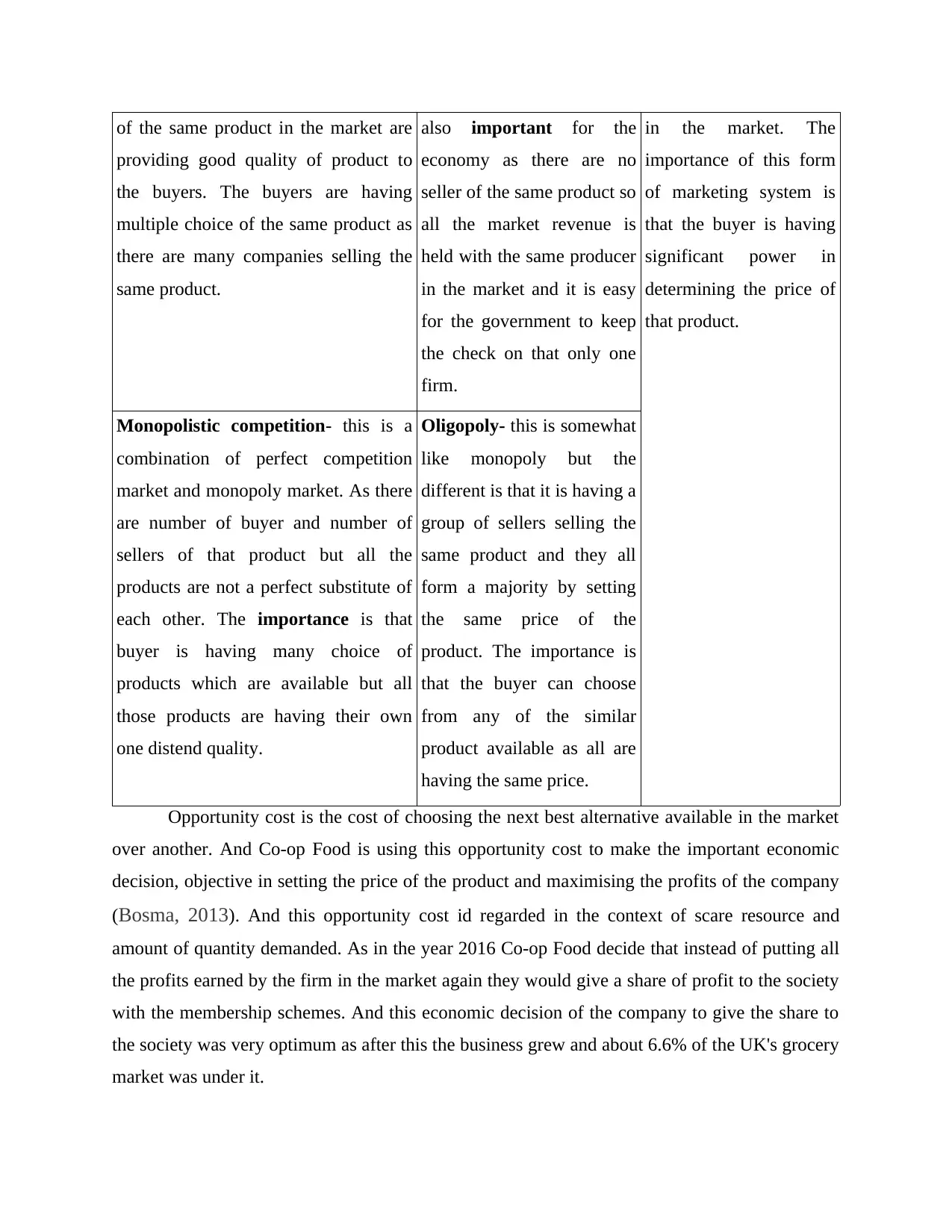
of the same product in the market are
providing good quality of product to
the buyers. The buyers are having
multiple choice of the same product as
there are many companies selling the
same product.
also important for the
economy as there are no
seller of the same product so
all the market revenue is
held with the same producer
in the market and it is easy
for the government to keep
the check on that only one
firm.
in the market. The
importance of this form
of marketing system is
that the buyer is having
significant power in
determining the price of
that product.
Monopolistic competition- this is a
combination of perfect competition
market and monopoly market. As there
are number of buyer and number of
sellers of that product but all the
products are not a perfect substitute of
each other. The importance is that
buyer is having many choice of
products which are available but all
those products are having their own
one distend quality.
Oligopoly- this is somewhat
like monopoly but the
different is that it is having a
group of sellers selling the
same product and they all
form a majority by setting
the same price of the
product. The importance is
that the buyer can choose
from any of the similar
product available as all are
having the same price.
Opportunity cost is the cost of choosing the next best alternative available in the market
over another. And Co-op Food is using this opportunity cost to make the important economic
decision, objective in setting the price of the product and maximising the profits of the company
(Bosma, 2013). And this opportunity cost id regarded in the context of scare resource and
amount of quantity demanded. As in the year 2016 Co-op Food decide that instead of putting all
the profits earned by the firm in the market again they would give a share of profit to the society
with the membership schemes. And this economic decision of the company to give the share to
the society was very optimum as after this the business grew and about 6.6% of the UK's grocery
market was under it.
providing good quality of product to
the buyers. The buyers are having
multiple choice of the same product as
there are many companies selling the
same product.
also important for the
economy as there are no
seller of the same product so
all the market revenue is
held with the same producer
in the market and it is easy
for the government to keep
the check on that only one
firm.
in the market. The
importance of this form
of marketing system is
that the buyer is having
significant power in
determining the price of
that product.
Monopolistic competition- this is a
combination of perfect competition
market and monopoly market. As there
are number of buyer and number of
sellers of that product but all the
products are not a perfect substitute of
each other. The importance is that
buyer is having many choice of
products which are available but all
those products are having their own
one distend quality.
Oligopoly- this is somewhat
like monopoly but the
different is that it is having a
group of sellers selling the
same product and they all
form a majority by setting
the same price of the
product. The importance is
that the buyer can choose
from any of the similar
product available as all are
having the same price.
Opportunity cost is the cost of choosing the next best alternative available in the market
over another. And Co-op Food is using this opportunity cost to make the important economic
decision, objective in setting the price of the product and maximising the profits of the company
(Bosma, 2013). And this opportunity cost id regarded in the context of scare resource and
amount of quantity demanded. As in the year 2016 Co-op Food decide that instead of putting all
the profits earned by the firm in the market again they would give a share of profit to the society
with the membership schemes. And this economic decision of the company to give the share to
the society was very optimum as after this the business grew and about 6.6% of the UK's grocery
market was under it.
⊘ This is a preview!⊘
Do you want full access?
Subscribe today to unlock all pages.

Trusted by 1+ million students worldwide
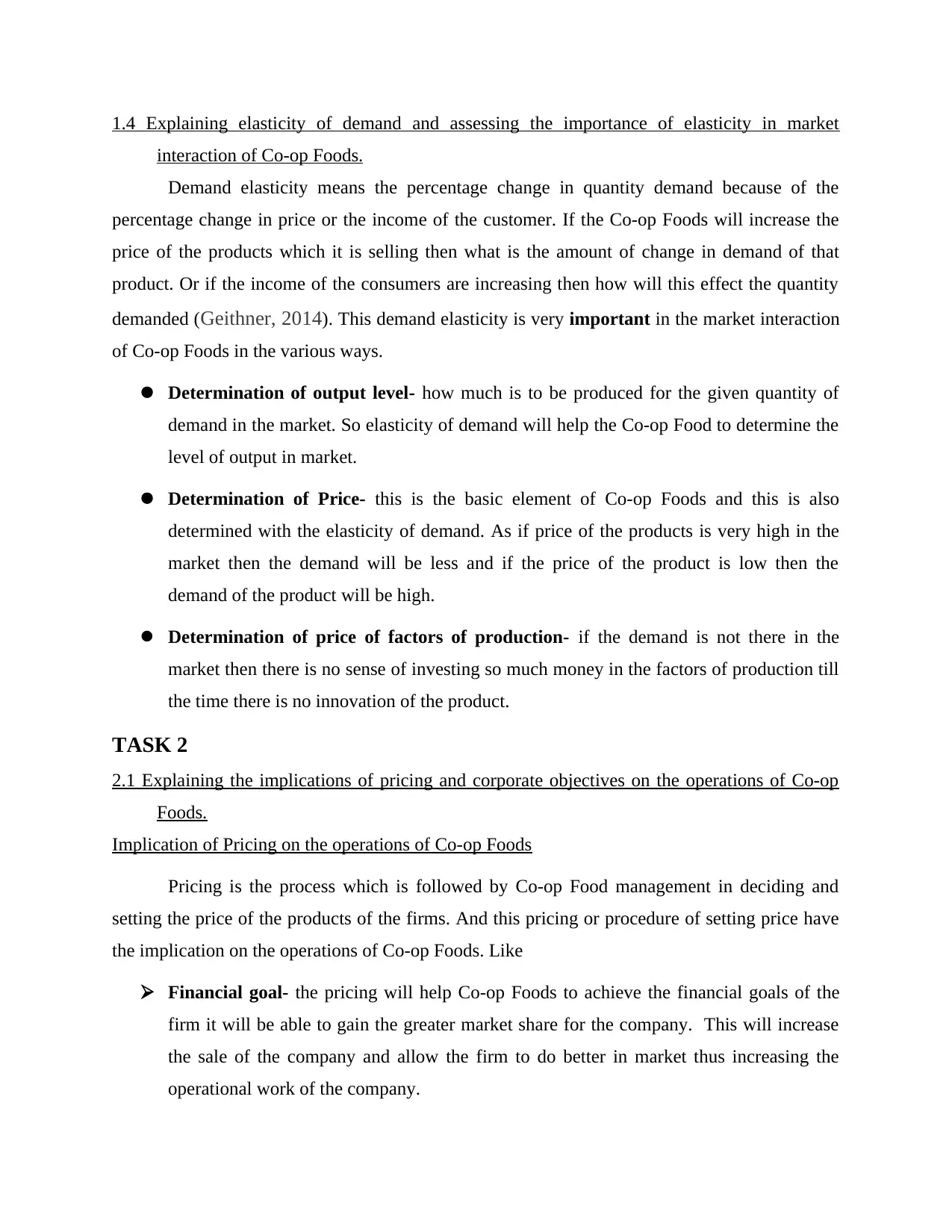
1.4 Explaining elasticity of demand and assessing the importance of elasticity in market
interaction of Co-op Foods.
Demand elasticity means the percentage change in quantity demand because of the
percentage change in price or the income of the customer. If the Co-op Foods will increase the
price of the products which it is selling then what is the amount of change in demand of that
product. Or if the income of the consumers are increasing then how will this effect the quantity
demanded (Geithner, 2014). This demand elasticity is very important in the market interaction
of Co-op Foods in the various ways.
Determination of output level- how much is to be produced for the given quantity of
demand in the market. So elasticity of demand will help the Co-op Food to determine the
level of output in market.
Determination of Price- this is the basic element of Co-op Foods and this is also
determined with the elasticity of demand. As if price of the products is very high in the
market then the demand will be less and if the price of the product is low then the
demand of the product will be high.
Determination of price of factors of production- if the demand is not there in the
market then there is no sense of investing so much money in the factors of production till
the time there is no innovation of the product.
TASK 2
2.1 Explaining the implications of pricing and corporate objectives on the operations of Co-op
Foods.
Implication of Pricing on the operations of Co-op Foods
Pricing is the process which is followed by Co-op Food management in deciding and
setting the price of the products of the firms. And this pricing or procedure of setting price have
the implication on the operations of Co-op Foods. Like
Financial goal- the pricing will help Co-op Foods to achieve the financial goals of the
firm it will be able to gain the greater market share for the company. This will increase
the sale of the company and allow the firm to do better in market thus increasing the
operational work of the company.
interaction of Co-op Foods.
Demand elasticity means the percentage change in quantity demand because of the
percentage change in price or the income of the customer. If the Co-op Foods will increase the
price of the products which it is selling then what is the amount of change in demand of that
product. Or if the income of the consumers are increasing then how will this effect the quantity
demanded (Geithner, 2014). This demand elasticity is very important in the market interaction
of Co-op Foods in the various ways.
Determination of output level- how much is to be produced for the given quantity of
demand in the market. So elasticity of demand will help the Co-op Food to determine the
level of output in market.
Determination of Price- this is the basic element of Co-op Foods and this is also
determined with the elasticity of demand. As if price of the products is very high in the
market then the demand will be less and if the price of the product is low then the
demand of the product will be high.
Determination of price of factors of production- if the demand is not there in the
market then there is no sense of investing so much money in the factors of production till
the time there is no innovation of the product.
TASK 2
2.1 Explaining the implications of pricing and corporate objectives on the operations of Co-op
Foods.
Implication of Pricing on the operations of Co-op Foods
Pricing is the process which is followed by Co-op Food management in deciding and
setting the price of the products of the firms. And this pricing or procedure of setting price have
the implication on the operations of Co-op Foods. Like
Financial goal- the pricing will help Co-op Foods to achieve the financial goals of the
firm it will be able to gain the greater market share for the company. This will increase
the sale of the company and allow the firm to do better in market thus increasing the
operational work of the company.
Paraphrase This Document
Need a fresh take? Get an instant paraphrase of this document with our AI Paraphraser
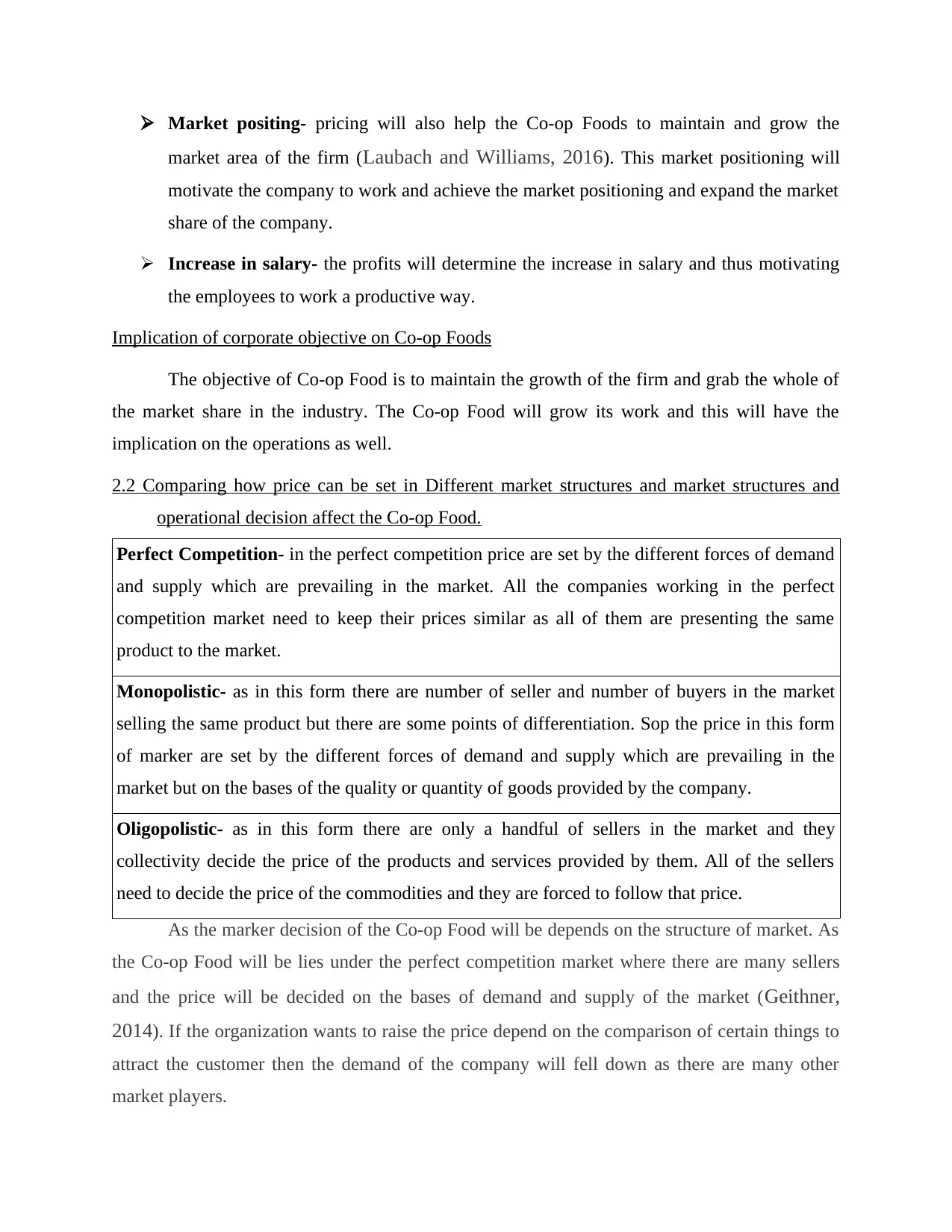
Market positing- pricing will also help the Co-op Foods to maintain and grow the
market area of the firm (Laubach and Williams, 2016). This market positioning will
motivate the company to work and achieve the market positioning and expand the market
share of the company.
Increase in salary- the profits will determine the increase in salary and thus motivating
the employees to work a productive way.
Implication of corporate objective on Co-op Foods
The objective of Co-op Food is to maintain the growth of the firm and grab the whole of
the market share in the industry. The Co-op Food will grow its work and this will have the
implication on the operations as well.
2.2 Comparing how price can be set in Different market structures and market structures and
operational decision affect the Co-op Food.
Perfect Competition- in the perfect competition price are set by the different forces of demand
and supply which are prevailing in the market. All the companies working in the perfect
competition market need to keep their prices similar as all of them are presenting the same
product to the market.
Monopolistic- as in this form there are number of seller and number of buyers in the market
selling the same product but there are some points of differentiation. Sop the price in this form
of marker are set by the different forces of demand and supply which are prevailing in the
market but on the bases of the quality or quantity of goods provided by the company.
Oligopolistic- as in this form there are only a handful of sellers in the market and they
collectivity decide the price of the products and services provided by them. All of the sellers
need to decide the price of the commodities and they are forced to follow that price.
As the marker decision of the Co-op Food will be depends on the structure of market. As
the Co-op Food will be lies under the perfect competition market where there are many sellers
and the price will be decided on the bases of demand and supply of the market (Geithner,
2014). If the organization wants to raise the price depend on the comparison of certain things to
attract the customer then the demand of the company will fell down as there are many other
market players.
market area of the firm (Laubach and Williams, 2016). This market positioning will
motivate the company to work and achieve the market positioning and expand the market
share of the company.
Increase in salary- the profits will determine the increase in salary and thus motivating
the employees to work a productive way.
Implication of corporate objective on Co-op Foods
The objective of Co-op Food is to maintain the growth of the firm and grab the whole of
the market share in the industry. The Co-op Food will grow its work and this will have the
implication on the operations as well.
2.2 Comparing how price can be set in Different market structures and market structures and
operational decision affect the Co-op Food.
Perfect Competition- in the perfect competition price are set by the different forces of demand
and supply which are prevailing in the market. All the companies working in the perfect
competition market need to keep their prices similar as all of them are presenting the same
product to the market.
Monopolistic- as in this form there are number of seller and number of buyers in the market
selling the same product but there are some points of differentiation. Sop the price in this form
of marker are set by the different forces of demand and supply which are prevailing in the
market but on the bases of the quality or quantity of goods provided by the company.
Oligopolistic- as in this form there are only a handful of sellers in the market and they
collectivity decide the price of the products and services provided by them. All of the sellers
need to decide the price of the commodities and they are forced to follow that price.
As the marker decision of the Co-op Food will be depends on the structure of market. As
the Co-op Food will be lies under the perfect competition market where there are many sellers
and the price will be decided on the bases of demand and supply of the market (Geithner,
2014). If the organization wants to raise the price depend on the comparison of certain things to
attract the customer then the demand of the company will fell down as there are many other
market players.
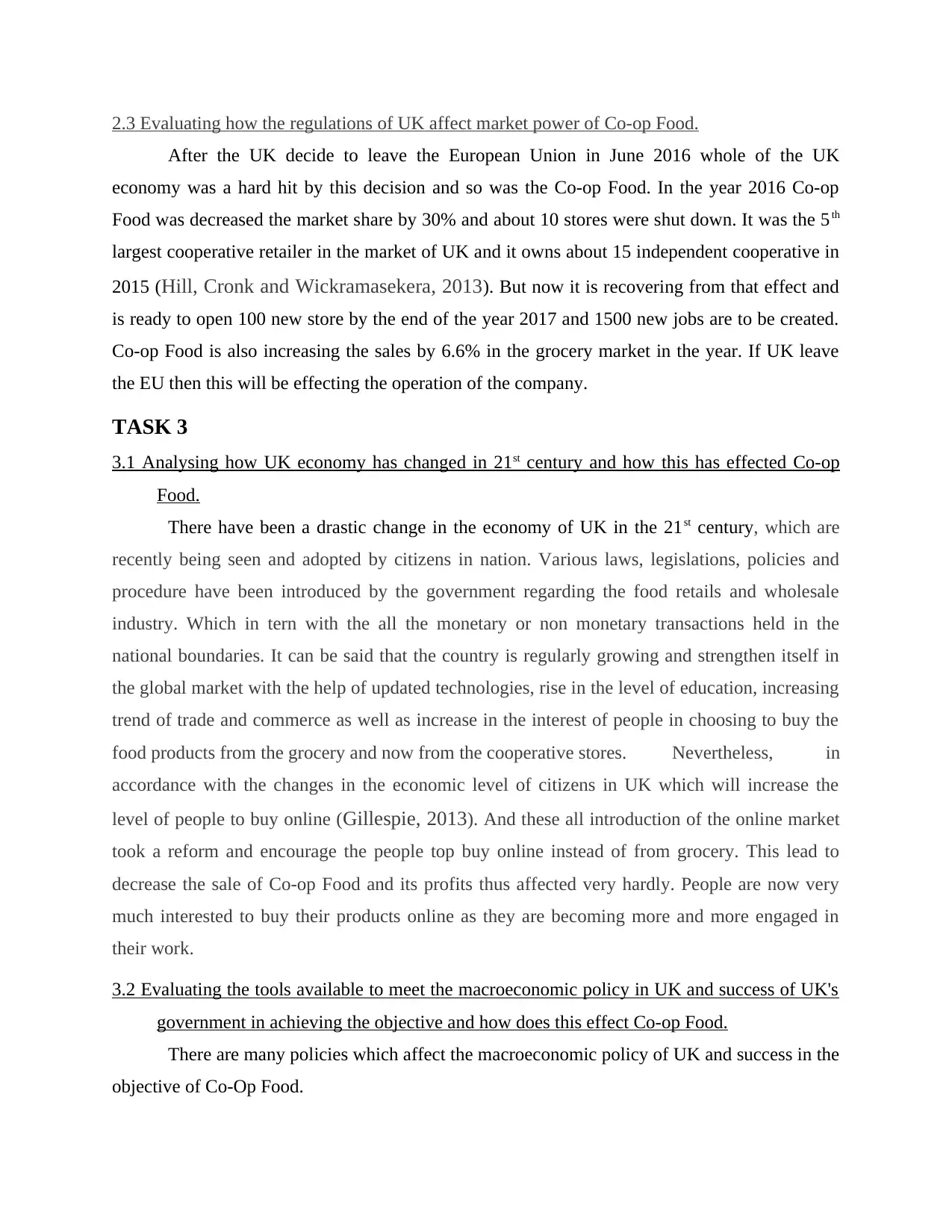
2.3 Evaluating how the regulations of UK affect market power of Co-op Food.
After the UK decide to leave the European Union in June 2016 whole of the UK
economy was a hard hit by this decision and so was the Co-op Food. In the year 2016 Co-op
Food was decreased the market share by 30% and about 10 stores were shut down. It was the 5 th
largest cooperative retailer in the market of UK and it owns about 15 independent cooperative in
2015 (Hill, Cronk and Wickramasekera, 2013). But now it is recovering from that effect and
is ready to open 100 new store by the end of the year 2017 and 1500 new jobs are to be created.
Co-op Food is also increasing the sales by 6.6% in the grocery market in the year. If UK leave
the EU then this will be effecting the operation of the company.
TASK 3
3.1 Analysing how UK economy has changed in 21st century and how this has effected Co-op
Food.
There have been a drastic change in the economy of UK in the 21st century, which are
recently being seen and adopted by citizens in nation. Various laws, legislations, policies and
procedure have been introduced by the government regarding the food retails and wholesale
industry. Which in tern with the all the monetary or non monetary transactions held in the
national boundaries. It can be said that the country is regularly growing and strengthen itself in
the global market with the help of updated technologies, rise in the level of education, increasing
trend of trade and commerce as well as increase in the interest of people in choosing to buy the
food products from the grocery and now from the cooperative stores. Nevertheless, in
accordance with the changes in the economic level of citizens in UK which will increase the
level of people to buy online (Gillespie, 2013). And these all introduction of the online market
took a reform and encourage the people top buy online instead of from grocery. This lead to
decrease the sale of Co-op Food and its profits thus affected very hardly. People are now very
much interested to buy their products online as they are becoming more and more engaged in
their work.
3.2 Evaluating the tools available to meet the macroeconomic policy in UK and success of UK's
government in achieving the objective and how does this effect Co-op Food.
There are many policies which affect the macroeconomic policy of UK and success in the
objective of Co-Op Food.
After the UK decide to leave the European Union in June 2016 whole of the UK
economy was a hard hit by this decision and so was the Co-op Food. In the year 2016 Co-op
Food was decreased the market share by 30% and about 10 stores were shut down. It was the 5 th
largest cooperative retailer in the market of UK and it owns about 15 independent cooperative in
2015 (Hill, Cronk and Wickramasekera, 2013). But now it is recovering from that effect and
is ready to open 100 new store by the end of the year 2017 and 1500 new jobs are to be created.
Co-op Food is also increasing the sales by 6.6% in the grocery market in the year. If UK leave
the EU then this will be effecting the operation of the company.
TASK 3
3.1 Analysing how UK economy has changed in 21st century and how this has effected Co-op
Food.
There have been a drastic change in the economy of UK in the 21st century, which are
recently being seen and adopted by citizens in nation. Various laws, legislations, policies and
procedure have been introduced by the government regarding the food retails and wholesale
industry. Which in tern with the all the monetary or non monetary transactions held in the
national boundaries. It can be said that the country is regularly growing and strengthen itself in
the global market with the help of updated technologies, rise in the level of education, increasing
trend of trade and commerce as well as increase in the interest of people in choosing to buy the
food products from the grocery and now from the cooperative stores. Nevertheless, in
accordance with the changes in the economic level of citizens in UK which will increase the
level of people to buy online (Gillespie, 2013). And these all introduction of the online market
took a reform and encourage the people top buy online instead of from grocery. This lead to
decrease the sale of Co-op Food and its profits thus affected very hardly. People are now very
much interested to buy their products online as they are becoming more and more engaged in
their work.
3.2 Evaluating the tools available to meet the macroeconomic policy in UK and success of UK's
government in achieving the objective and how does this effect Co-op Food.
There are many policies which affect the macroeconomic policy of UK and success in the
objective of Co-Op Food.
⊘ This is a preview!⊘
Do you want full access?
Subscribe today to unlock all pages.

Trusted by 1+ million students worldwide
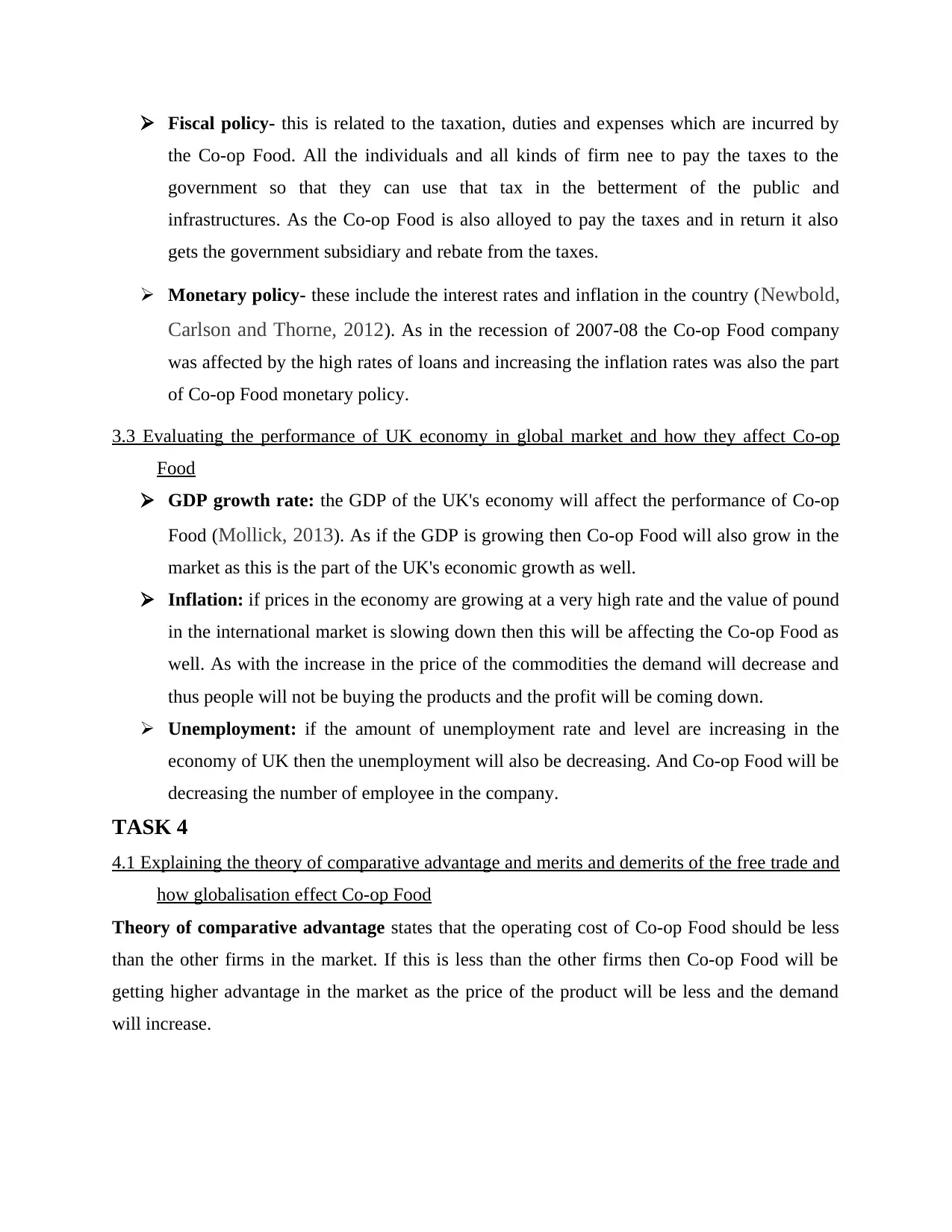
Fiscal policy- this is related to the taxation, duties and expenses which are incurred by
the Co-op Food. All the individuals and all kinds of firm nee to pay the taxes to the
government so that they can use that tax in the betterment of the public and
infrastructures. As the Co-op Food is also alloyed to pay the taxes and in return it also
gets the government subsidiary and rebate from the taxes.
Monetary policy- these include the interest rates and inflation in the country (Newbold,
Carlson and Thorne, 2012). As in the recession of 2007-08 the Co-op Food company
was affected by the high rates of loans and increasing the inflation rates was also the part
of Co-op Food monetary policy.
3.3 Evaluating the performance of UK economy in global market and how they affect Co-op
Food
GDP growth rate: the GDP of the UK's economy will affect the performance of Co-op
Food (Mollick, 2013). As if the GDP is growing then Co-op Food will also grow in the
market as this is the part of the UK's economic growth as well.
Inflation: if prices in the economy are growing at a very high rate and the value of pound
in the international market is slowing down then this will be affecting the Co-op Food as
well. As with the increase in the price of the commodities the demand will decrease and
thus people will not be buying the products and the profit will be coming down.
Unemployment: if the amount of unemployment rate and level are increasing in the
economy of UK then the unemployment will also be decreasing. And Co-op Food will be
decreasing the number of employee in the company.
TASK 4
4.1 Explaining the theory of comparative advantage and merits and demerits of the free trade and
how globalisation effect Co-op Food
Theory of comparative advantage states that the operating cost of Co-op Food should be less
than the other firms in the market. If this is less than the other firms then Co-op Food will be
getting higher advantage in the market as the price of the product will be less and the demand
will increase.
the Co-op Food. All the individuals and all kinds of firm nee to pay the taxes to the
government so that they can use that tax in the betterment of the public and
infrastructures. As the Co-op Food is also alloyed to pay the taxes and in return it also
gets the government subsidiary and rebate from the taxes.
Monetary policy- these include the interest rates and inflation in the country (Newbold,
Carlson and Thorne, 2012). As in the recession of 2007-08 the Co-op Food company
was affected by the high rates of loans and increasing the inflation rates was also the part
of Co-op Food monetary policy.
3.3 Evaluating the performance of UK economy in global market and how they affect Co-op
Food
GDP growth rate: the GDP of the UK's economy will affect the performance of Co-op
Food (Mollick, 2013). As if the GDP is growing then Co-op Food will also grow in the
market as this is the part of the UK's economic growth as well.
Inflation: if prices in the economy are growing at a very high rate and the value of pound
in the international market is slowing down then this will be affecting the Co-op Food as
well. As with the increase in the price of the commodities the demand will decrease and
thus people will not be buying the products and the profit will be coming down.
Unemployment: if the amount of unemployment rate and level are increasing in the
economy of UK then the unemployment will also be decreasing. And Co-op Food will be
decreasing the number of employee in the company.
TASK 4
4.1 Explaining the theory of comparative advantage and merits and demerits of the free trade and
how globalisation effect Co-op Food
Theory of comparative advantage states that the operating cost of Co-op Food should be less
than the other firms in the market. If this is less than the other firms then Co-op Food will be
getting higher advantage in the market as the price of the product will be less and the demand
will increase.
Paraphrase This Document
Need a fresh take? Get an instant paraphrase of this document with our AI Paraphraser
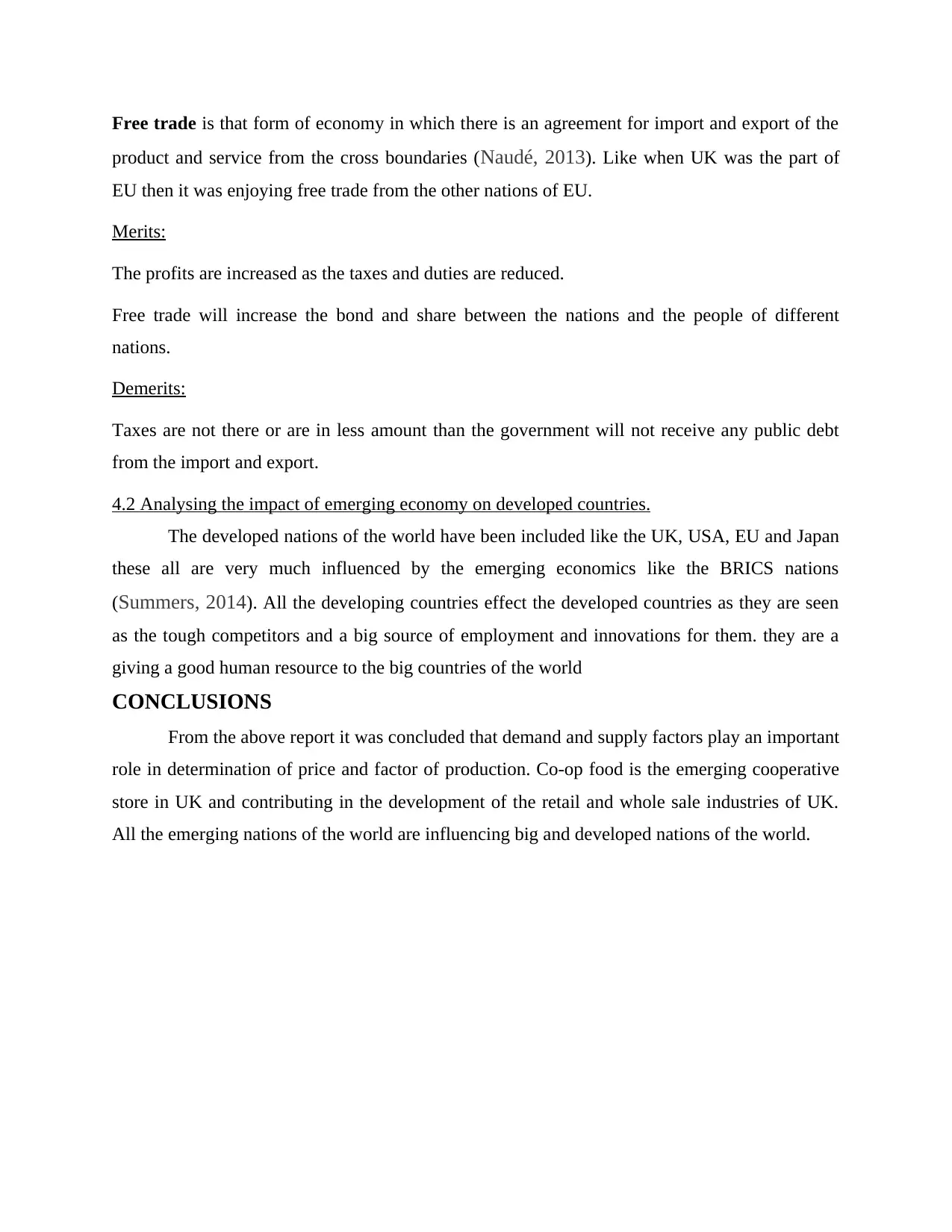
Free trade is that form of economy in which there is an agreement for import and export of the
product and service from the cross boundaries (Naudé, 2013). Like when UK was the part of
EU then it was enjoying free trade from the other nations of EU.
Merits:
The profits are increased as the taxes and duties are reduced.
Free trade will increase the bond and share between the nations and the people of different
nations.
Demerits:
Taxes are not there or are in less amount than the government will not receive any public debt
from the import and export.
4.2 Analysing the impact of emerging economy on developed countries.
The developed nations of the world have been included like the UK, USA, EU and Japan
these all are very much influenced by the emerging economics like the BRICS nations
(Summers, 2014). All the developing countries effect the developed countries as they are seen
as the tough competitors and a big source of employment and innovations for them. they are a
giving a good human resource to the big countries of the world
CONCLUSIONS
From the above report it was concluded that demand and supply factors play an important
role in determination of price and factor of production. Co-op food is the emerging cooperative
store in UK and contributing in the development of the retail and whole sale industries of UK.
All the emerging nations of the world are influencing big and developed nations of the world.
product and service from the cross boundaries (Naudé, 2013). Like when UK was the part of
EU then it was enjoying free trade from the other nations of EU.
Merits:
The profits are increased as the taxes and duties are reduced.
Free trade will increase the bond and share between the nations and the people of different
nations.
Demerits:
Taxes are not there or are in less amount than the government will not receive any public debt
from the import and export.
4.2 Analysing the impact of emerging economy on developed countries.
The developed nations of the world have been included like the UK, USA, EU and Japan
these all are very much influenced by the emerging economics like the BRICS nations
(Summers, 2014). All the developing countries effect the developed countries as they are seen
as the tough competitors and a big source of employment and innovations for them. they are a
giving a good human resource to the big countries of the world
CONCLUSIONS
From the above report it was concluded that demand and supply factors play an important
role in determination of price and factor of production. Co-op food is the emerging cooperative
store in UK and contributing in the development of the retail and whole sale industries of UK.
All the emerging nations of the world are influencing big and developed nations of the world.
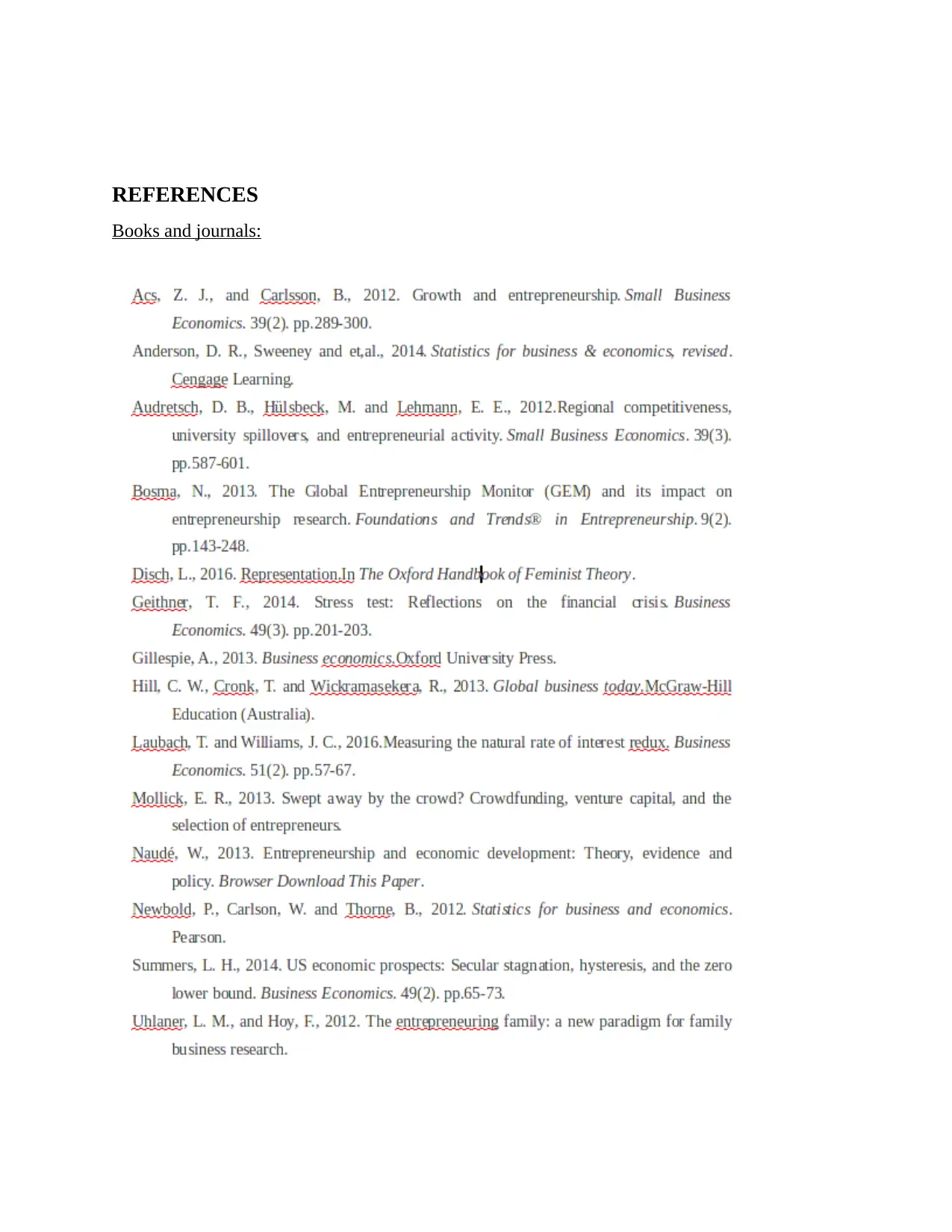
REFERENCES
Books and journals:
Books and journals:
⊘ This is a preview!⊘
Do you want full access?
Subscribe today to unlock all pages.

Trusted by 1+ million students worldwide
1 out of 13
Related Documents
Your All-in-One AI-Powered Toolkit for Academic Success.
+13062052269
info@desklib.com
Available 24*7 on WhatsApp / Email
![[object Object]](/_next/static/media/star-bottom.7253800d.svg)
Unlock your academic potential
Copyright © 2020–2026 A2Z Services. All Rights Reserved. Developed and managed by ZUCOL.





